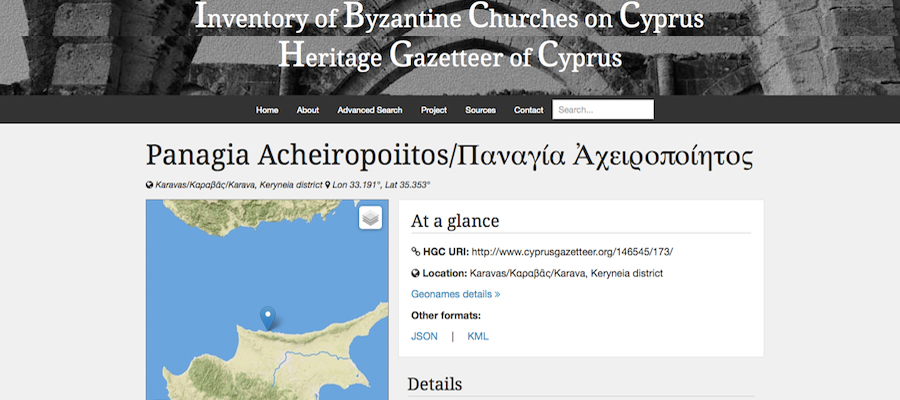Cyprus Gazetteer Project, Kings College London, November 3, 2015, 6:45–9:00pm
The team of the Cyprus Gazetteer will mark the launch of the Inventory of Byzantine Churches of Cyprus (iBCC) and the Heritage Gazetteer of Cyprus (HGC).
Stuart Dunn (Department of Digital Humanities) and Tassos Papacostas (Department of Classics) will present the two components of the project.
Dr Marina Solomidou-Ieronymidou (Director, Department of Antiquities, Cyprus) and Dr Antonis Hadjikyriacou (Foundation for Research and Technology-Hellas) will then present short papers:
Listing and digitization of ancient monuments as part of the management of Cypriot Archaeological Heritage
The Department of Antiquities is the governmental body responsible for the management of archaeological heritage in Cyprus. As such, it employs a series of strategies and mechanisms aiming at protecting, preserving and promoting the vast number of the island’s archaeological sites, monuments, and museums. The objective of this paper is to present the main issues embedded in archaeological management, ranging from the listing of an ancient monument, to its excavation, the application of conservation measures and its promotion. While attention will be paid to the problems and concerns inherent in these processes, the main focus of the paper will be the diachronic overview of the listing of the ancient monuments and the digitization of the related data, in order to demonstrate the variability and complexity involved; it will also attempt to shed light on the ways in which archaeological management has been affected by the broader political and economic framework.
Marina Solomidou-Ieronymidou obtained her PhD in medieval archaeology at the Sorbonne, and joined the Cyprus Department of Antiquities whose director she became in 2014. Since the late 1980s she has been conducting excavations at the medieval sugar mills of Episkopi and Kolossi (Limassol district). She is a member of numerous national and international committees (ICOM, ICOMOS, UNESCO).
The Mediterranean Insularities project: dealing with toponyms in Ottoman Cyprus
Mediterranean Insularities is a comparative study of Cyprus and Crete that maps the development of economic structures in the two islands during the Ottoman period. One of the main sources of the project is the first Ottoman fiscal register (mufassal defteri) compiled in 1572 in the aftermath of the conquest of Cyprus. A unique and valuable source in the study of historical toponymy, the register provides information on 1,137 villages and taxable localities that fill in several gaps in existing knowledge. The presentation will discuss the problems of working with this source, how to deal with the challenges it entails, and how to utilize its insights in compiling a gazetteer for Ottoman Cyprus.
Antonis Hadjikyriacou is Marie Curie Fellow at the Center for Mediterranean Studies, Foundation for Research and Technology-Hellas. He earned his Ph.D. in History from the School of Oriental and African Studies, University of London, and he is completing his monograph entitled Insularity and Empire: Ottoman Cyprus in the Early Modern Mediterranean. He has worked and taught at Princeton University, SOAS, the University of Cyprus and the University of Crete.
This event is open to all and free to attend but booking is required.
